#american occupation of the philippines
Explore tagged Tumblr posts
Text
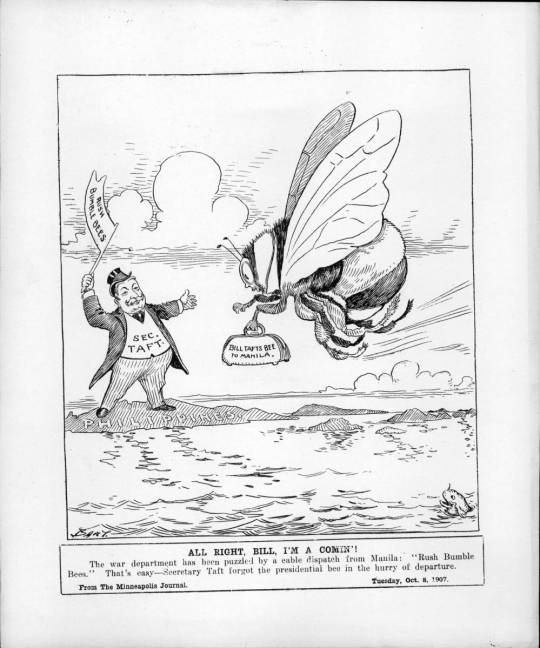
All Right, Bill, I'm a Comin'!
October 8, 1907
A large bee flies towards the Philippines, with a bag labelled 'Bill Taft's Bee to Manila.' Taft stands waving a flag reading "Rush Bumblebees"
The caption reads "The war department has been puzzled by a cable dispatch from Manila: 'Rush Bumble Bees.' That's easy - Secretary Taft forgot the presidential bee in the hurry of departure."
The bees had been ordered as part of a plan to cross-pollinate Philippine crops.
See Also: Theodore Roosevelt; William Howard Taft
From Hennepin County Library
Original available at: https://digitalcollections.hclib.org/digital/collection/Bart/id/6073/rec/1734
#charles bartholomew#political cartoon#william howard taft#bees#american occupation of the philippines#philippine history
4 notes
·
View notes
Text

American occupation era Philippines but our girlie here is secretly a vampire hunter at a fancy party looking for her target 🦇🧛♂️🌴
#nik's art#artists on tumblr#digital art#digital illustration#digital painting#Philippines#filipino#oc#original characters#tropical gothic#filipino aesthetic#1900s#gothic aesthetic#American occupation#southeast asia#dark fantasy#historical fantasy#vampire hunter#character art#character design#character illustration#aesthetic art#vampire#monster art#concept art
1K notes
·
View notes
Text
just learned that one of my great uncles was a survivor of the Bataan Death March
#he was a Filipino POW#also my great grandfather met MacArthur????#what a shame I never got to talk to my grandparents about this when they were alive#they were alive in the Philippines during Japanese and American occupation#ANYWAY#julia.txt
6 notes
·
View notes
Text
Love my in laws but omg enough debating I'm exhausted 😭 I hate a hypothetical argument I hate philosophy.
#he was so extra today#at lunch i said that SPAM came to the Philippines via American colonialism/occupation which is literally like. A fact.#and he heard colonnialism and went off i was like 👁️👄👁️ why are this energy
3 notes
·
View notes
Text
remember that the Philippines wasn't a free country until 1946. the Philippines hasn't even been free yet for 100 years.
remember that the Philippines was promised freedom when America 'defeated' the Spanish, America continued their occupation for another 43 years so that they could start selling goods to areas in Asia. they did not allow the Philippines to rule themselves because they saw us as savages, unfit and unready to let our own country prosper.
then, once they released us, they let anyone rich enough with the 'proper' credentials to rule our towns, our provinces. they made sure these dictators looked just like us so that we would be easier to puppet.
then with these dictators, they massacre the suffering people who are only trying to survive. they call it a 'war on drugs' but it is a genocide of the people. we are still being killed.
slowly but surely, there are less and less dark skinned pinoys in the filipino population. they are killing my people. i want us Americans to think about that, i really, really do.
all of these conflicts feel so, so far away- but at some point you have to wonder as they grow closer and closer, will you be behind the gun or in front of the barrel?
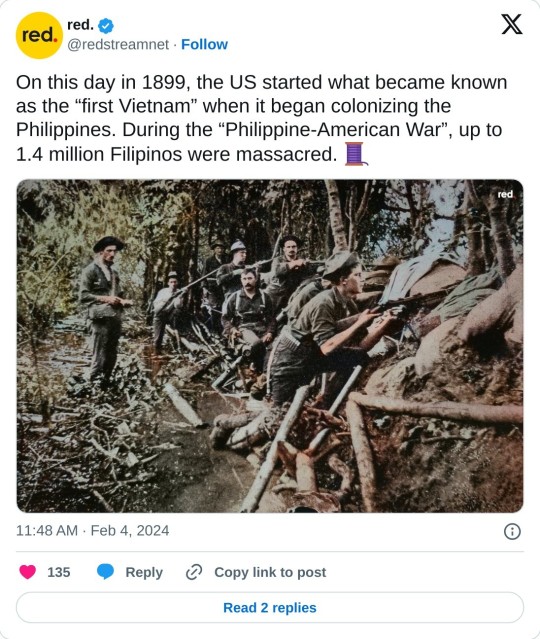
As always, death to imperialism.
#town reblogs#town talks#a bit of a rant sorry#philippines#i miss the Philippines but i also know why i cannot go back there#i dont think many americans know about the Philippines and the true nature of american occupation#and. bleh. I think I know too much of it
4K notes
·
View notes
Text
Employers desire foreign workers who are accustomed to the hazardous work sites of industrial construction; in particular, they specifically solicit migrants who do not have a history of labor organizing within SWANA. In response, labor brokerage firms brand themselves as offering migrant workers who are deferential. Often, labor brokers conflate the category of South Asian with docility; [...] as inherently passive, disciplined, and, most important, unfettered by volatile working conditions. "We say quality, they [U.S. employers] say seasoned. We both know what it means. Workers who are not going to quit, not going to run away in the foreign country and do as they are told.” [...]
For migrants, the U.S. oil industry presents a rare chance to apply their existing skill set in a country with options for permanent residency and sponsorship of family members. Migrants wish to find an end to their temporary worker status; they imagine the United States as a liberal economy in which labor standards are enforced and there are opportunities for citizenship and building a life for their family. [...] What brokers fail to explain is that South Asian migrants are being recruited as guest workers. Migrants will not have access to U.S. citizenship or visas for family members; in fact, their employment status will be quite similar to their SWANA migration.
While nations such as the Philippines have both state-mandated and independent migrant rights agencies, the Indian government has minimal avenues for worker protection. These are limited to hotlines for reporting abusive foreign employers and Indian consulates located in a few select countries of the SWANA region. [... Brokers] emphasize the docility of Indian migrants in comparison to the disruptive tendencies of other Asian migrant workers. [...] “Some of these Filipino men you see make a lot of trouble in the Arab countries. Even their women, who work as maids and such, lash out. The employer says one wrong thing and the workers get the whole country [the Philippines] on the street. [...] But you don’t see our people creating a tamasha [spectacle] overseas.” [...] Just as Filipinx migrants are racialized to be undisciplined labor, Indian brokers construct divisions within the South Asian workforce to promote the primacy of their own firms. In particular, Pakistani workers are racialized as an abrasive population.
[...] While the public image of the South Asian American community remains as model minorities, presumed to be primarily upwardly mobile professionals, the global reality of the population is quite to the contrary. [...] From the historic colonial routes initiated by British occupation of South Asia to the emergence of energy markets within the countries of SWANA, migrants have been recruited to build industries by contributing their labor to construction projects. Within the last decade, these South Asian migrants, with experience in the SWANA oil industry, have been actively solicited as guest workers into the energy sector of the United States. The growth of hydraulic fracturing has opened new territory for oil extraction; capitalizing on the potential market are numerous stakeholders who have invested in industrial construction projects across the southwestern United States. The solicitation of South Asian construction workers is not coincidental. [...] Kartik, a globally competitive firm’s broker, explains the connection of Indian labor to practices of the past. “You know we come from a long history of working in foreign lands. Even the British used to send us to Africa and the Arab regions to work in the mines and oil fields. It’s part of our history.”
Seasoning Labor: Contemporary South Asian Migrations and the Racialization of Immigrant Workers, Saunjuhi Verma in the Journal of Asian American Studies
669 notes
·
View notes
Text

The cast for that webcomic I was working on. Set in the Philippines during the end of Spanish colonialism and the beginning of the American occupation. About a trans boy who lives in a disappointment’s room by night, a faith healer for hire and a girl against his will by day.
4K notes
·
View notes
Text
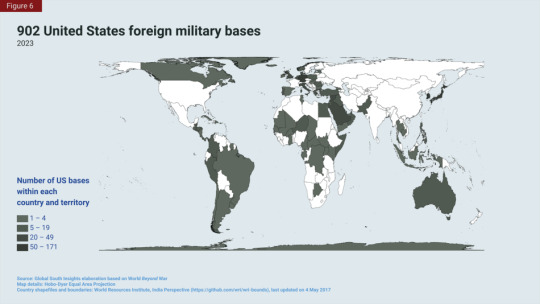
"In the twenty-first century, nothing is more indicative of U.S. empire than the global reach of the U.S. military. Much of this power comes from its approximately 800 military bases located in around eighty countries, accounting for about 95 percent of the world’s foreign military bases. No other country comes close to the U.S. level of worldwide military control. ... The United States probably has more military bases than any other empire in history, yet most Americans remain largely ignorant of their numbers and location. The history of these bases is an imperial history, tied to war, occupation, and military expansion. Wherever the U.S. military has gone bases have usually followed, giving the United States an ongoing presence long after the war or occupation is over.
The creation of bases has accompanied each wave of U.S. expansion. Military forts enabled continental conquest—255 in total—which functioned as foreign bases on land that was often still controlled by Native peoples. These forts operated as the military outposts of settler-colonialism and were targeted by Native peoples as violations of territorial integrity. The War of 1898 and subsequent occupation of overseas colonies resulted in a global basing system, and by 1938 the United States had fourteen military bases outside its continental borders in Puerto Rico, Cuba, Panama, the Virgin Islands, Hawaii, Midway, Wake, Guam, the Philippines, Shanghai, the Aleutians, American Samoa, and Johnston Island. ... The explosion of foreign bases during World War II would be followed by surges during the Korean War, the War in Vietnam, and the Wars in Afghanistan and Iraq, showing that wars and occupations continue to expand U.S. territory, even if the form of those acquisitions has shifted since the days of settler-colonialism and annexation. The contemporary number, which hovers around 800 to 900, is still an impressive network that places the military within striking distance of every spot on the globe. Historian Bruce Cumings calls the modern form of U.S. empire an 'archipelago empire,' small islands of U.S. control from which power can be projected anywhere in the world. It has become increasingly difficult to tell where the boundaries of the United States begin and where they end.
... For most U.S. citizens these bases are either invisible or accepted as a natural part of our national security apparatus. David Vine argues that Americans 'consider the situation normal and accept that US military installations exist in staggering numbers in other countries, on other peoples’ land. On the other hand, the idea that there would be foreign bases on US soil is unthinkable.'"
Stefan Aune, "American Empire," in At War: The Military and American Culture in the Twentieth Century and Beyond, 2018
Map source
654 notes
·
View notes
Text
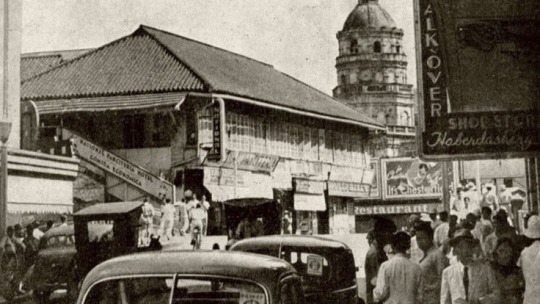
i saw you in a dream a two-part Karasu Tabito x Filipina!reader story part one
Synopsis: The Japanese Occupation was far kinder than you expected, especially in his eyes.
Word Count: 19.1k
Content Warning: historical au (based in the Philippines), talks about the Japanese Occupation in the Philippines, glimpses of the events during World War 2, love despite the war, angst
Author's Notes: I tried to be as mild as I could with the information of the war, as well as the reader's situation. Based on my research, some families were exempted from the horrors. I tried to be as clear as possible with the story too, so if you have any notes after reading, please let me know thru the comments, reblogs, asks, or DMs! I would love to discuss things with you guys!
@fishii28 ✨

"We have to do this," your father iterated once more as he paced across the living room in anxiety, "It's for the safety of our family, Y/n, the safety of your sisters and your mother... most especially you. You're our eldest daughter, you have to understand."
"Compliance? For safety? How is that even a good thing, Papa? These Japanese are... massacring the country, our city! The best we can do is fight back!" You reasoned out, your voice raising in frustration. Of all people in the world, you would never expect your father to bend the knee to the colonizers. Sure, his allegiance is to the Americans, who also colonized your country after the Spanish did the same, but he held hope that they would be saved by them. For now, he has to think of the best way for his family to be safe, especially with the news going around about the abuses against women. He couldn't bear to live the rest of his life thinking that the women in his family would be facing the same fate as everyone, so compliance with the Japanese was the best option.
"My dearest, please. I don't want you to be..." he sniffled and lowered his head, then he cried in anguish. "I don't want to endanger all of you. The situation is hard, I understand that, but the best way for us to be safe is to side with them. Despite the crimes they're committing to our country and the people, we need to be safe. Think of yourself, Y/n. Think of your mother and your sisters. They're still so young." He walked towards you and pulled you into a hug, the tightest he had given you. "I love our country. You know that out of everyone. But right now, my love for my family overcomes that."
Two weeks later, a Japanese General, accompanied by his Lieutenant General, entered your home and had a written agreement with them, officially making your family untouchable from the atrocities of the war. You listened to their conversation from your room, peeking through the crack of your door. It was a surprise that the General had some English skills, which you then figured that maybe they had to learn for the invasion. From what you have gathered in their conversation, they have laid out some privileges for the family: you'll sustain your way of life and be exempted from the abuses, forced labor, and serve as entertainment for the soldiers.
That was good enough, you thought.
You then heard a cry from the other room. Your youngest sister's voice can be heard through the walls, and unfortunately, throughout the house. You saw the General and Lieutenant General perk up as soon as her cries spilled out. Your parents' bedroom door flew open, and out went your sister, crying for your father. "Maria!" You exclaimed, bursting out of your room to grab her before she could even reach the living room. You carried her in your arms despite her protests, but your eyes landed on the guests, specifically the Lieutenant General. He was about your age, a little stern at first glance. His blue eyes met yours, full of curiosity and a tinge of annoyance from the disturbance. "I'm sorry, I'm sorry," you said as you walked away, carrying your crying sister back to your parents' room, closing the door behind you.
A few moments have passed, and you heard the bedroom door open, revealing your father, looking more distraught than he should be. He looked at you with apologetic eyes, and your stomach flipped at the sight. "What did you do, Papa?" you asked, your voice anxious and breaking.
"I'm sorry, my dearest. It had to be done."
Lieutenant General Karasu Tabito became a frequent visitor to your home. The reason? He became interested in you despite your short presence that day, thanks to your good-for-nothing sister. You're forced to face him every day with soft fake smiles that never reached your eyes. You try your best to be kind, at least just for the facade, so your family would be safer. You try your best to entertain his stories, all interesting and questionable. You try to respond accordingly, just as how your mother trained you all these years when the time comes for suitors to arrive at your doorstep.
Karasu was nothing but patient and kind, though sometimes, his eyes gave it away. He would sometimes look like he was analyzing you, the way you move, the way you speak, the way you laugh. Then one day, he said, "You're faking." That caught you a little off-guard. You cleared your throat and shifted in your seat, pulling your skirt down your knees. "I beg your pardon?" you replied.
"I don't like the way you're faking your interactions with me."
Like any other person in this time of war, hearing that would feel like a death sentence, especially with the situation your family was in. You, acting like their sacrificial lamb to this Japanese soldier, and him, a wolf. You smiled at him and shook your head. "I don't think I understand."
"Y/n, I know you feel forced to talk to me almost every day. But I want to let you know that I'm not like anyone out there. I don't agree with what they're doing, and I would..."
"You would?"
"If there wasn't a war, things like taking an interest in knowing you better wouldn't be that hard. Because I want to know you more and take you as my wife," he continued, his eyes full of honesty.
It took a year before you agreed to marry him, which your father was more than enthusiastic about. For him, it meant that your alliance and complacency with the Japanese colonizers were now set in stone and that your family would be forever safe from the horrors you read from underground newspapers that often arrive on your doorstep. You made sure Karasu never found any of it every time he visited your home before the marriage.
Life with him was peaceful, or it seemed to be. You were away from all the noise, and Karasu ensured you would live as a married couple peacefully. Every morning, there was a routine of you two drinking coffee at the dining table, him reading the newspaper, Japanese issued ones, and you humming a tune. It was lovely. Sometimes, he'd hold your hand as he drinks his coffee, and you'd smile at him.
Mornings also included helping him into his uniform every time he's being called to the office, ironing it to perfection. You'd help him button up his shirt, then hand him his hat, sometimes dusting it off before you do. "I'll be back soon," Karasu would say with a smile, and you'd respond, "Take care."
Your afternoons are spent tending the garden and listening to the vinyl records your father gave you as a wedding gift. They were pretty old, and you played them anyway. You'd sway alone in the living room until you grew tired. Then it was time to prepare dinner for you and your husband.
He'd consistently arrive home at 6:00 PM, leaving his boots by the doorway before he walked to you as you worked in the kitchen. He'd give you a chaste kiss on your temple, whispering, "I'm home." You're always glad whenever he comes home because it means things haven't gotten worse yet.
One night after dinner, while you were washing the dishes, humming a tune you heard from one of your records, you heard Karasu rummage through the same shelf of records in your living room. You weren't concerned, no. It's just he never once had an interest in your collection, yet here he was. Then you heard him put on one of the records to the record player you had in your home.
"Y/n," he called out, his feet padded on the wooded floor of your shared home, "dance with me." You looked at him over your shoulder, giving him a kind smile. "Just after this, Karasu."
He sighed as walked nearer to the sink where you were and turned off the faucet. You faced him with a slight disappointment on your features and he just smiled at you. He took a towel hanging from the drawer handles, and then wrapped your hands with it, drying them for you. "The dishes can wait. Please, dance with me." You could only nod and walk back with him to the living room as the scratchy music filled the living room. Karasu placed his hands on your hips as you wrapped your arms around his shoulders, beginning to sway with him. "We never danced before," he stated in which you hummed in reply. "I think the war hasn't let us, Karasu."
He shushed you softly as he shook his head. "No mentions of war in this home, Y/n. I told you that before, remember?"
"Sorry."
"It's okay. No need to. I want us to live away from it, even if we have to pretend. Keep your mind away from it."
Karasu sighed shakily as he pulled you closer to him, embracing you. You can feel the tension radiating from him, so you rest your hand over his chest, feeling his heartbeat. "Karasu, what's wrong?"
"You've been calling me Karasu for the longest time. Maybe it's time for you to call me Tabito," he said, his voice low, ignoring your question. You nodded and spoke his name. It felt new on your tongue, but it sounds much better now that you won't be calling his, and your, last name. Tabito rested his forehead against yours as you two were engulfed by the silence of the night and the hum of your record player.
It wasn't long until that peace slowly faded as Tabito would spend more time away from your home.
He came home with news of a possible battle, one that was inevitable. He told you in great detail what Japan would do to defend the Philippines from the Americans, and it would be bloody. You listened to him intently, holding his shaking hands. Tabito warned you of two outcomes: either they will lose and leave the country, or Japan will continue their reign over the islands. If you were asked right now, you don't know what to feel. If you were still 2 years younger, you'd feel overjoyed about the liberation of your country. However, now that you've come to know Tabito, and eventually, loved him more than you imagined, Japan losing would mean him leaving you behind.
The news of Japan's surrender broke you.
The sight of Tabito running to you and apologizing broke you.
"I know I never told you this in our whole marriage but remember that I love you. I loved every moment with you, and I would trade everything to be with you," he cried as he cupped your wet cheeks. "I love you, I love you, Y/n."
He left the next day along with the other Japanese troops, leaving you in your once-shared home.
It's such a shame, others would say, that your Japanese husband left you without a child. That you were left alone with hopes of him returning to get you. That after 3 years, you ended up lying on your deathbed.
That your last words before you closed your eyes were his name.

A second part of this story will be posted soon, so keep an eye!
#lazyyy writes#bllk#blue lock#bllk fanfic#blue lock fanfiction#bllk angst#blue lock angst#bllk x reader#bllk x you#bllk x y/n#bllk x female reader#filipina reader#blue lock x reader#blue lock x you#blue lock x y/n#blue lock x female reader#bllk karasu#blue lock karasu#bllk karasu tabito#blue lock karasu tabito#karasu tabito#karasu x reader#karasu x you#karasu angst
83 notes
·
View notes
Text
The urge toward cosmopolitanism was a direct effect of the rise of the United States to world power: Americans were, it seemed, everywhere! At the close of World War II, the United States was the undisputed world power, the only major force left standing and with a booming wartime economy. The troops could have come home after the war, but instead they stayed on and built permanent bases, and were periodically replenished by new crops of American boys. The American project spread itself around the world through military occupation (West Germany, South Korea, Japan), war (Korea, Vietnam, Laos, Cambodia), and an archipelago of military bases that stretched from Micronesia to the Philippines to Puerto Rico. To complement this military success, a host of government-sponsored programs—Fulbright Fellowships, state-sponsored arts tours, Area Studies departments, federal grants for literary translation—were founded, many of them still in existence today and promoting an ethos of worldly “exchange.” The hope was to bring all the world to Americans, since Americans seemed to be bringing themselves to all the world. This was one of the few moments in American life when government policy was mirrored by a positive popular style, rather than, as in the 1930s or 1960s, darkly refracted through a dissident culture more vibrant and appealing. Another way of putting this is that not many citizens opposed American foreign policy in the 1940s and 1950s, and so the High Imperial Aesthetic thrived precisely because it did not have to compete with serious dissent. This was made possible, in part, by an insistence that the United States was spreading democracy rather than colonizing, which meant leaving behind the adamantly imperial jingoism of the earlier century for the more subtle propaganda of liberal cosmopolitanism. High Imperial Aesthetics emerged as a way to gloss over the dissonance between what was said and what was done—but also, to manage these tensions.
157 notes
·
View notes
Text
I'm not as well versed in the Philippines' history since I read this a long time ago, but the Philippines were taken from Spain as colonies after the US war with Spain in 1898. At the time, the Filipinos were already waging their own independence war against Spain. The Filipinos declared the First Philippine Republic in June 12 1899. However, the United States refused to accept it, which led to a bloody independence war that lasted decades, where the US military commited genocidal acts:
After World War II and the end of Japanese occupation, because of the obvious drag of holding a colonial possession of millions of people across the Pacific* during an era of decolonization, the US eventually "gave" the Philippines their independence in 1946 after World War II. The fact that they choose the 4th of July was not casual at all: they very much tried to imprint themselves, the former colonial power, as the gentle benefactors of a "daughter republic". There are INCREDIBLY racist cartoons of the US setting itself up as a "teacher" to its conquered nations, "preparing" them for self-determination.
This was a common practice by the US. I've read this in depth a long time ago and I'm sure you can find this in better detail elsewhere, but as the US was rising as an imperial power, it presented itself as an "Empire of Freedom", in suppossed contrast to the European powers, at the same time it did the same, if not worse (as shown in the Philipines) exploitation and crimes across the Pacific and Latin America. If they had could, they would have extended an entire plantation economy all around the Caribbean. Countless interventions testify this.
Of course the Philippines became independent, but it wasn't out of the benvolence of the United States. The US was perfectly willing and able to annex places on the Pacific. Of course you know about Hawai'i and Puerto Rico, which centuries after, still does not have self-determination. But how many Usamericans know about the "associated states" of Palau, Micronesia and the Marshall Islands, of the military bases at Guam? And let alone the countless genocides in the continental US in the name of manifest destiny.
Anyways. My point is, if you saw a post claiming the Philippines' independence was in the 4th of July, maybe you should have asked yourself why, exactly.
135 notes
·
View notes
Text
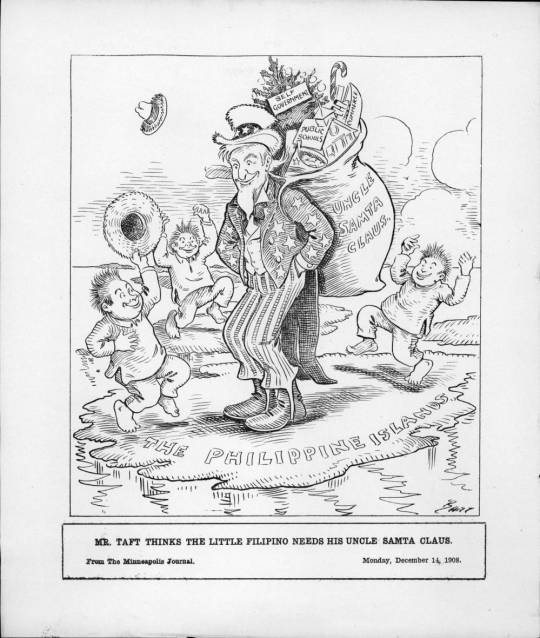
Mr. Taft Thinks the Little Filipino Needs His Uncle Samta Claus
December 14, 1908
Uncle Samta Claus brings gifts of self-government, public schools, and commerce to the Philippine Islands, to celebration.
At a dedication of a McKinley memorial on December 13, Taft re-iterated the stance taken by the U.S. government on the Philippines since 1900 when he said that the policies of his administration would be the same as McKinley's and that the U.S. must stay for the benefit of the people, according to the December 14th edition of the Minneapolis Tribune. The United States had occupied the Philippines since 1901.
From Hennepin County Library
Original available at: https://digitalcollections.hclib.org/digital/collection/Bart/id/5934/rec/2159
#charles bartholomew#political cartoon#philippine history#american occupation of the philippines#uncle sam#santa claus#american history
0 notes
Text
still thinking about filipinos in the fallout wasteland, but now in the context of my headcanon that fallout america annexed the philippines in 1946 instead of granting the nation its independence.
what made me think of this headcanon? the timeline between our world and the fallout world splits at about that period, and, well, there's precedent for the annexation: in real life, there were 50 years of american occupation, and there's ongoing american intereference in our politics, economy, and culture (essentially making the philippines an american neo-colony, but i digress), and considering how fallout america is just america turned up to 11, these things will just be magnified, and so: the philippine annexation of 1946.
now, there's nothing in fallout canon about the philippines except for a brief off-hand comment from the newscaster at the beginning of fallout 4 about american troops in mambajao (an island in camiguin) but this already tells me that, by 2077, if american military presence in the philippines has managed to reach that part of mindanao, the american occupation has intensified.
that little nugget already paints such a vivid picture of what's happening in fallout philippines - an american military base in mindanao tells me that more indigenous communities were displaced (real life example: the aeta and ibaloi communities in luzon, who still, to this day, cannot return to their ancestral lands), that sexual exploitation of women and children was rampant (irl: the sex industry in angeles city, among other areas), that american soldiers were free to enact violence on filipinos without facing any consequences (irl: jennifer laude's murder at the hands of joseph pemberton), that american imperialism is thriving in the archipelago, and that the sino-american war is serious and ramping up.
but let's see what the newscaster actually says:
"It would also appear our troops stationed overseas are experiencing some unusual weather, as well. On the Island of Mambajao the nights are cold. Unseasonably so for Southeast Asia. But for the 5th Infantry, that's as comfortable as an Autumn jamboree. All the easier for our mechanized hellcats to drive any screaming Commie meanies right into the Bohol Sea."
"screaming commie meanies" tells me that there's a significant communist presence in the philippines, which i am taking to mean that the communist party of the philippines and the new people's army are alive and well and fighting against the american occupation. i really don't think there'd be many chinese communist spies in the philippines at this time since filipino communists are against chinese imperialism as well, but tbh this part isn't solidified in my brain as much... anyway
essentially, fallout philippines has the problems of current, real life philippines, just amplified. american occupation on one hand, chinese imperialism on the other, unusual cold weather (which tells me that climate change was also a problem in the fallout universe), the threat of nuclear war... all with ordinary filipinos in the middle. would it be a stretch to say that a lot of them fled to america and established their own communities there? that those communities would have thrived and retained our creativity and sense of community/pagkakapwa abroad? that those communities would have survived the bombs and banded together and kept themselves and their culture alive, in the apocalypse?
#shh peri shhh#philippine politics? in my fallout game? it's more likely than you think#i haven't even gotten into the poverty and corruption that would've been rampant in an annexed philippines since america would likely#take our natural resources and land for themselves (as it's doing right now; see what americans are doing to siquijor)#but this is too much already lmao
81 notes
·
View notes
Text
“[in u.s. history class] why are we critical thinking lmao” DIYOS KO PO
put me back of philippines
#i swear to god bro looked at u.s' occupation of the philippines in the overseas expansion module#and went like 'yeah that sounds fine'#senator beveridge speech thats like 'filipinos are so fucking stupid lmfao'#MY MAN#YOUR AMERICAN STUDENT IS HERE BEING INFINITELY STUPIDER THAN A FILIPINO ELEMENTARY STUDENT WOULD EVER BE#YOUR AMERICAN COLLEGE STUDENT WITH ROCKS FOR BRAINS#im fucking done man im fucking dead#immense amounts of psychic damage suffered
6 notes
·
View notes
Text
The Ikugan [Filipino mythology]!
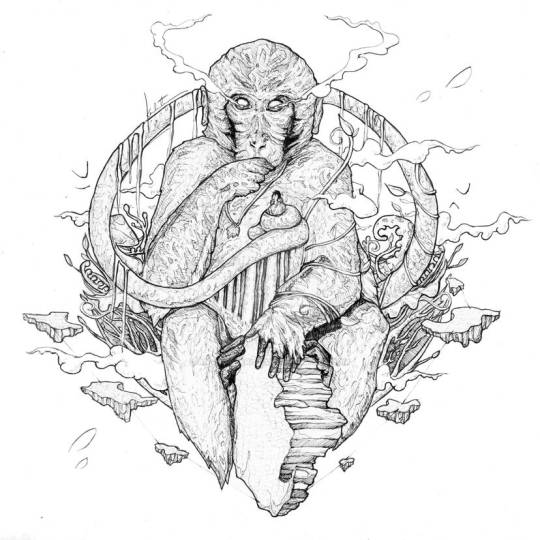
On the island of Mindanao in the Philippines, there are tales of a mysterious group of humanoid creatures with long tails. They are called ‘Ikugan’, which roughly translates to ‘tailed men’ and they were notorious for their ferocity in battle. Their raids supposedly drove the people on Mindanao back from the Agusan valley to Surigao. After a series of vicious raids, the Ikugan creatures disappeared without a trace, satisfied with the destruction they had caused.
Ikugan have an ape-like appearance and are covered in fine, soft fur. They are also said to have disproportionally large hands and feet, perhaps to climb trees more easily. It is said that this species harbours a deep hatred towards humans.
Their characteristic tail is used to hang from trees. When a human victim passes underneath the waiting Ikugan, they drop down to attack.
In 1931, during the American occupation of the Philippines, some of these stories were recorded. It was theorized that the monstrous tailed invaders were actually the real-life Moro people, whose raids devastated the island in the 18th and 19th century. These warriors were known for their particularly long swords, which had the appearance of tails when sheathed. There is another theory that the stories actually originated from the late 12th century, when a group of pirates raided shore settlements. These raiders supposedly threw javelins which were attached to a rope, which may or may not be the origin of the story about humanoid creatures with long tails. This is unproven and remains a theory, however.
Sources: Cruz, F. A. and Adiong, N. M., 2020, International Studies in the Philippines: Mapping New Frontiers in Theory and Practice, Routledge, 282 pp., p. 27. Ramos, M. D., 1971, Creatures of Lower Philippine Mythology, Quezon, University of the Philippines Press. (image source: AnthonyKristan on Deviantart)
#Filipino mythology#Philippine mythology#humanoid creatures#monsters#mythical creatures#creatures#mythology#folklore
37 notes
·
View notes
Text
Noah Berlatsky at Everything Is Horrible:
As several commenters have pointed out, it’s hard to know how to react to Trump’s recent threats to conquer Greenland and/or Canada and/or Panama by force and/or economic coercion. Is this actually a plan? Is it a weird phantom his rage-calcified synapses produced when the microphone got thrust in front of him? Does taking it seriously lend it credence it shouldn’t have? Does mocking it downplay the danger? World leaders are in fact taking it seriously; France and Germany both warned Trump not to attack the borders of the EU. On social media, as you’d expect, people have taken a more mocking tone. One commenter joked that they would accept annexing Canada if every province got two senate votes. Fwiw, I very much doubt that Trump will actually try to annex Canada or Greenland. I fear that some sort of military intervention in Panama is a good bit more likely, given Trump’s racism and the long history of US presidents stealing shit from Latin America whenever they feel like it. But whether or not Trump implements any of his imperial schemes, I think it’s worth thinking through what conquest of Greenland, or Panama, or Canada would actually mean. Trump may not pursue this particular evil plan, but it’s worth explaining at least briefly why it’s evil, if only as a reminder of just how ugly Trump’s disdain for democracy is.
Disenfranchising millions
The quip about Canada electing Democratic Senators is telling I think, because it underlines a central problem of colonialism in democratic polities That problem is that, in theory, claiming more territory is also claiming more voters. If you engineer a hostile takeover of a territory, you’ve just added an electorate which hates you. If Canadians or Panamanians are allowed to vote in US elections, they will generally vote to regain independence first and foremost. At the very least, they are likely to vote against the asshole that launched the invasion. This is not a new or unique problem. Colonial representation, or the lack thereof, was the cause of the American Revolution; Britain wanted control over the colonists, but it did not want to give them votes in Parliament. Or, as another example, there’s Israel—a “democracy” only if you ignore the fact that Palestinians in Gaza and the West Bank can’t vote, because if they could vote they’d quickly demand an end to the occupation and control over their own territory and lives, which Israel’s government does not want to give them.
Trump is a fool, but he does have some sense of who votes for him and who doesn’t. And he’s consistent in saying that people who don’t vote for him should not be allowed to vote at all. Any annexation of Canada, or Greenland, or Panama, would be done on MAGA terms—which means that the people in those countries would be disenfranchised. Remember that Puerto Rico and other US territories still don’t have full US voting rights! Trump would absolutely not let Canadians vote for Democratic Senators. MAGA would say that Canadians needed time to learn the ways of American democracy, or he would say they were not loyal, and demand that anyone who wanted to vote had to swear an oath to the US, and to Trump personally. You might then get Senators from Canada—elected by an all pro-Trumpist far right rump electorate.
Colonialism is bad
Trump has of course claimed that Canada/Greenland/Panama would be better off under MAGA. The pretense is thin though; it’s obvious that Trump wants additional territory because he thinks it would make the US bigger and more powerful, and perhaps just because he likes the idea of taking stuff by force. This duplicates the historical disconnect between colonial rhetoric and colonial policy. Colonizers always say that they are working for the good of the colonized. Rudyard Kipling famously encouraged the US to invade the Philippines for the good of the Filipinos; “Fill full the mouth of famine/and make the sickness cease.” Walter Rodney in his classic How Europe Underdeveloped Africa (1972) notes that “colonial apologists” claim that colonial rule was responsible for “economic modernization” and “political uplift and emancipation.”
Rodney puts a wrecking ball through those pro colonial arguments. He points out that European development in Africa was all aimed at extracting resources for the benefit of the colonizers, not the colonized. Europeans only built roads where they needed to get goods from the interior to the coast; they did not invest in infrastructure to allow Africans to travel in their own countries, or between two countries. When Africans wanted to learn new technologies and build new industries, they were systematically stifled; the British made it illegal for Ugandans to own cotton gins, for example.
[...]
Why aren’t you laughing?
Again, it feels ridiculous to talk seriously about what an invasion of Canada or Greenland or Panama might mean practically. It’s not going to happen. Why talk about the consequences for democracy, or the potential for exploitation and cruelty, or the consequences for reproductive rights? It’s all silliness. It’s just Trump babbling.
Disenfranchising Canadians by annexing Canada is a foolish move.
23 notes
·
View notes